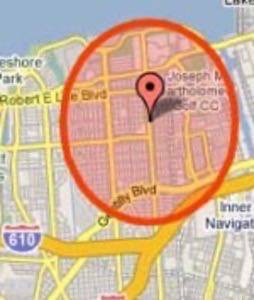Earlier this week, Juniper Research published a report which said the market for location-based services (think mobile check-in games like Foursquare, social networks like Loopt, location-enabled apps like Google Maps, etc.) will bring in revenues of more than $12.7 billion by 2014. Spurring this growth are a number of factors, including the increased number of App Stores, handset improvements, access to high-speed mobile Internet and improvements to positioning technology.

While it’s clear that location-based services are on the move, pinpointing a dollar amount to their market is a trickier subject. Has Juniper overestimated? U.K.-based consultancy Broadsight thinks so. “These numbers are way overstated,” says firm co-founder Alan Patrick, who concludes that’s it’s far too early to tell the market’s true size at this time.
An Argument Against LBS’s $13 Billion Market Forecast
Presenting at a local event for digitally-minded professionals, Patrick’s talk offered a dose of realism to what has been, until now, a well-hyped – perhaps overly hyped – technology trend. He claims that location-based services (“LBS”) is one of those cyclical hypes that comes around every ten years or so. “Like all overhyped areas, it comes complete with way overoptimistic market projections,” notes Patrick on the company blog.

Although he doesn’t call out analyst firm Juniper by name, he says that “$13 billion are the sorts of numbers being thrown around.” (Juniper predicts $12.7 billion). So how much does Patrick think the market’s worth? It’s too early to tell, he says.
Instead of focusing on what has influenced the market to grow thus far, Patrick examines the two determining factors that will impact the actual revenues LBS is able to generate: penetration and Average Revenue per User.
Penetration of the LBS market can vary widely including everything from smartphone users all the way to consumer devices like cars and even low-cost “Internet of Things” devices. The “Internet of Things” refers to real-world objects getting connected to the web. It can also include other web-connected devices like sensors or those incorporating RFID technology. The point Patrick was making is that the actual market value will be greatly influenced by how many devices end up web-connected and using LBS over the next few years. If, however, only smartphone users are taking advantage of LBS, then the market retains only niche value.
The second determinant is the Average Revenue per User. This also can vary between “free” – as when location services are given away as a part of something else – and those that are “paid for” outright. Users could “pay for” services either via subscription payments, software downloads or ad funding, for example.
Based on these determining factors, the actual market value for LBS, as you can see, may vary widely. Assigning it the $13 billion price tag is “of the ‘Panglos’ school of forecasting,” he says. That is, “assuming the best of all possible outcomes in the best of all possible worlds.”
Privacy Issues: A Limiting Factor to LBS Growth?
Patrick also brings up the privacy issues inherent in using the types of apps that broadcast your location, an issue we discussed ourselves just last week. At that time, the potential dangers in location broadcasting were brought to the forefront of our minds when the new site PleaseRobMe launched, displaying real-time updates from members of mobile social network Foursquare who broadcast their check-ins on Twitter. Although the site’s goal was simply to raise awareness of the issue, the news quickly spread until even local TV anchors were discussing it on the nightly news.

Even among tech bloggers such as ourselves, there is disagreement as to whether or not these services represent a true danger. A discussion in our writers’ chat room the other day had one writer positioning the services as tools for stalking, saying these types of apps “make it a heck of a lot easier for people” to do so. Meanwhile, another writer argued “well, having a knife around makes it easier to cut yourself, too.” (Names withheld to protect the innocent!)
The truth is, mainstream users will likely not jump on the LBS social bandwagon right away – unless Facebook launches something, that is. However, there’s a reason they haven’t done this yet – outside of the tech bubble, a good bit of the population is fairly concerned with protecting their privacy. You can argue that their fears come from an inherent lack of understanding about the realities of how LBS is used, but that won’t necessarily convince them. Just like anything, true growth and acceptance will take time. And fears like these aren’t exactly the sort that will go away over the next four years.
All that being said, while Patrick presents his ideas as “rational prognosis” regarding this industry, it’s possible that he’s being a little too down on the market’s potential. Maybe it won’t reach $13 billion, maybe it will…but like he said, it’s too soon to know.








